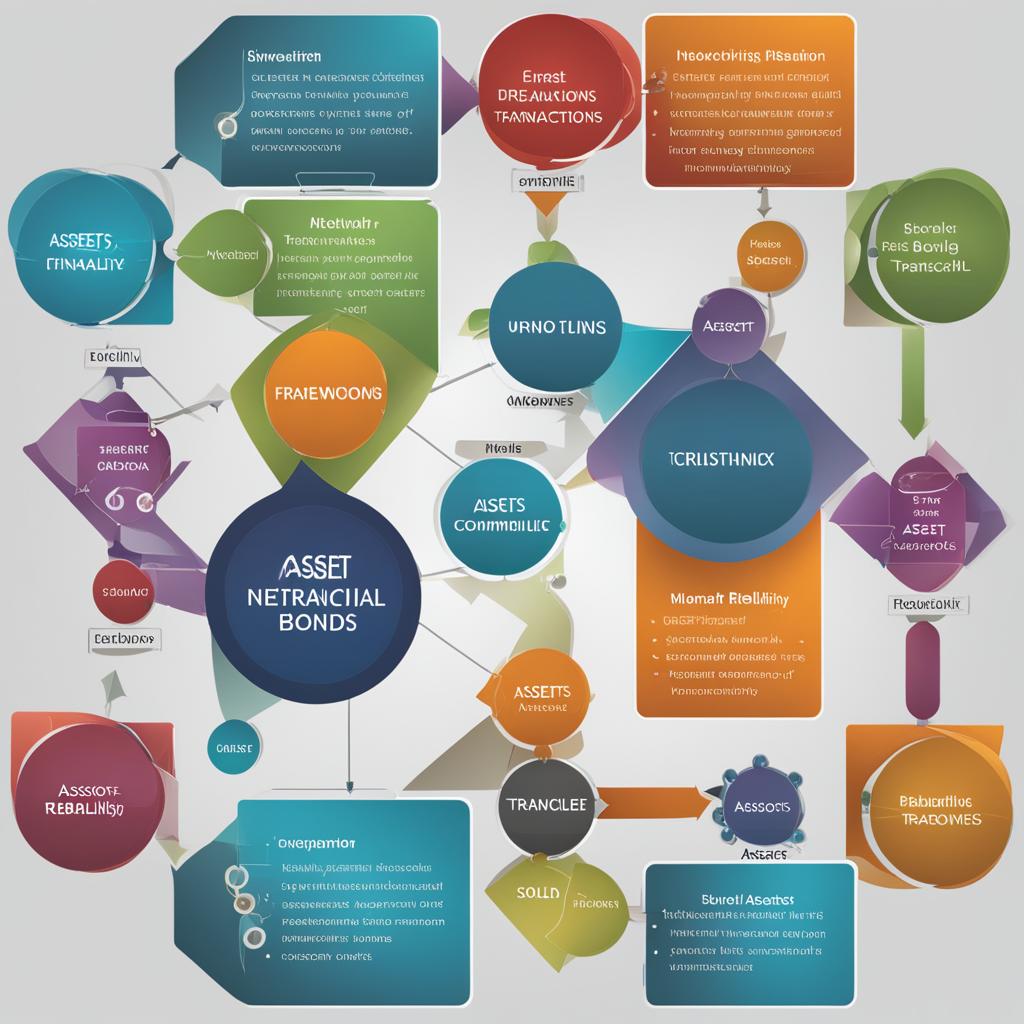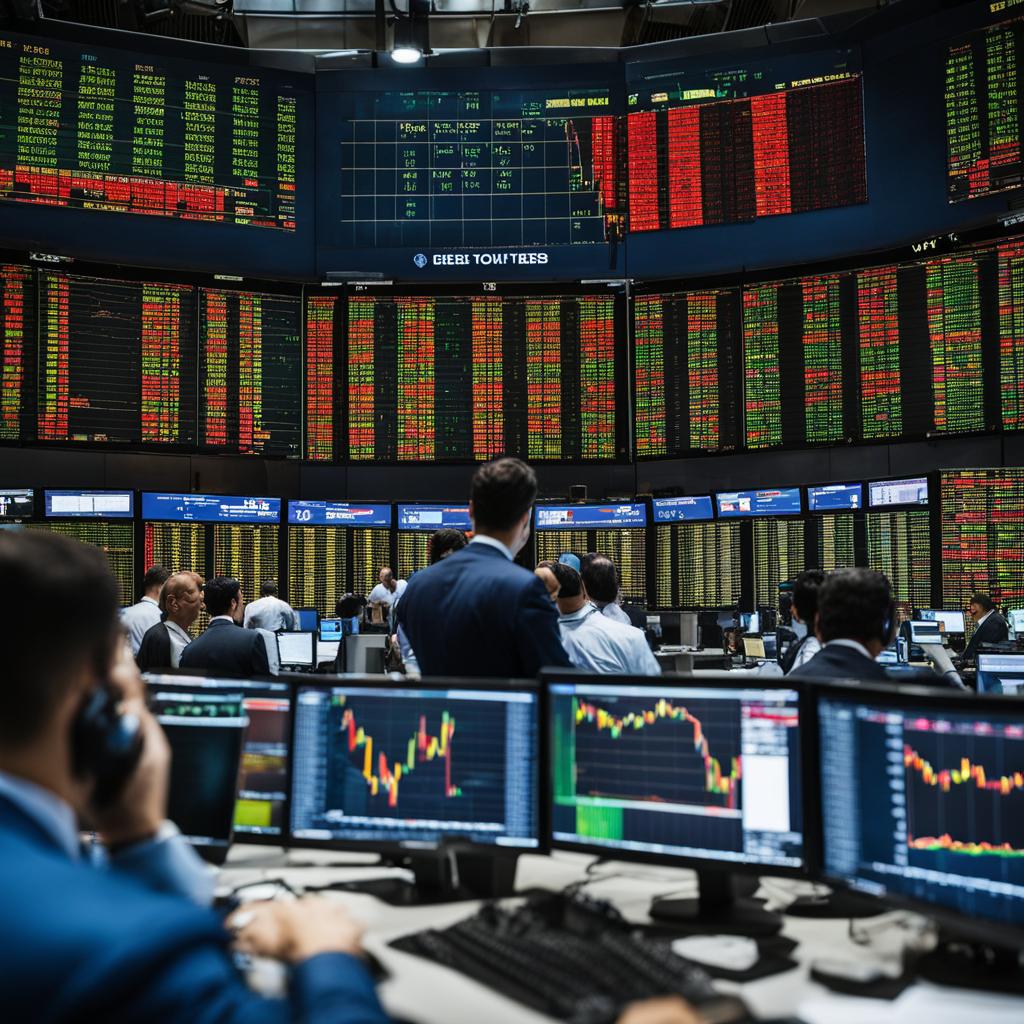Welcome to my blog! In this article, we will explore the fascinating world of broker-dealers in the financial industry. Whether you’re a seasoned investor or new to the world of securities trading, understanding the role and functions of a broker–dealer is essential for making informed investment decisions.
A broker–dealer is a financial entity that engages in the buying and selling of securities on behalf of clients, as well as for its own account. They act as both brokers, executing orders on behalf of clients, and dealers, trading for their own account. Broker-dealers provide a wide range of financial services, including investment advice, market-making activities, trading facilitation, investment research, and capital raising.
Key Takeaways:
- A broker-dealer is a financial entity that buys and sells securities on behalf of clients and for its own account.
- They provide various services, including investment advice, market-making activities, trading facilitation, investment research, and capital raising.
- Broker-dealers can be classified as wirehouses or independent broker-dealers.
- Wirehouses sell their own products, while independent broker-dealers sell products from outside sources.
- Some well-known broker-dealers include Fidelity Investments, Charles Schwab, and Edward Jones.
Now that we have a brief overview, let’s dive deeper into the fascinating world of broker-dealers and explore their role, types, functions, and much more. Shall we begin?
Understanding the Role of a Broker-Dealer
Broker-dealers are indispensable players in the financial industry, offering a diverse range of services that contribute to the efficient functioning of the market. As intermediaries between investors and the securities market, their role is multifaceted and crucial to maintaining liquidity, providing investment advice, facilitating trading activities, publishing research, and assisting companies in raising capital.
Broker-dealers can be firms, banks, or individual professionals. In their capacity as brokers, they execute orders on behalf of clients, buying and selling securities. As dealers, they trade securities for their own account, ensuring there is a market for their clients’ securities. This dual function allows them to serve both the interests of their clients and their own financial objectives.
Broker-dealers can be further categorized as wirehouses or independent broker-dealers. While wirehouses predominantly sell their own products, independent broker-dealers offer products from outside sources. The size of broker-dealers can range from large commercial banks to small independent boutiques, each catering to different market segments with unique offerings and expertise.
Let’s explore the key responsibilities of broker-dealers:
- Providing Investment Advice: Broker-dealers offer valuable insights and investment advice to clients, helping them make informed decisions about their investments.
- Supplying Liquidity: Through market-making activities, broker-dealers ensure there is sufficient liquidity in the market, allowing investors to buy or sell securities at fair prices.
- Facilitating Trading Activities: Broker-dealers play a vital role in facilitating trading activities, executing orders in a timely and efficient manner to ensure smooth transactions.
- Publishing Investment Research: Many broker-dealers conduct extensive research on various investment opportunities, publishing reports and analyses to provide valuable information to clients.
- Assisting with Capital Raising: Broker-dealers help companies raise capital by underwriting securities offerings and acting as intermediaries between issuers and investors.
The table below provides a comprehensive overview of the various services and functions performed by broker-dealers:
| Services | Functions |
|---|---|
| Investment Advice | Providing valuable insights, recommendations, and guidance to clients regarding investment opportunities. |
| Liquidity Provision | Ensuring there is a ready market for securities, enabling investors to buy or sell at fair prices. |
| Trading Facilitation | Executing orders on behalf of clients, ensuring smooth and efficient transactions. |
| Investment Research | Conducting research, analyzing market trends, and publishing reports to aid clients in making informed investment decisions. |
| Capital Raising | Assisting companies in raising funds through underwriting securities offerings and facilitating the issuance process. |
The Importance of Broker-Dealers in the Financial Industry
Broker-dealers fulfill a critical role in the financial industry by providing essential services that contribute to the smooth functioning of the market. Without their expertise and involvement, it would be challenging for investors to navigate the complexities of the securities market and access investment opportunities.
By leveraging their knowledge, resources, and market insights, broker-dealers play a vital role in helping investors achieve their financial goals, while also contributing to the overall growth and stability of the economy.
Stay tuned for the next section, where we will explore the different types of broker-dealers and their unique characteristics.
Types of Broker-Dealers
When it comes to broker-dealers, there are two main types that investors should be familiar with: wirehouses and independent broker-dealers. Understanding the differences between these two types of firms can help investors make informed decisions about their investments.
A wirehouse is a broker-dealer that sells its own products to clients. These companies typically have a large presence in the financial industry and offer a wide range of financial products and services. Some well-known wirehouses include Morgan Stanley, Bank of America Merrill Lynch, UBS, and Wells Fargo.
On the other hand, independent broker-dealers are firms that sell products from outside sources. These companies are not affiliated with any single financial institution and offer a diverse range of investment options to their clients. Some prominent independent broker-dealers include Edward Jones, LPL Financial, and Raymond James.
According to the Financial Industry Regulatory Authority (FINRA), there are over 3,975 broker-dealers to choose from. These broker-dealers serve different market segments and offer a variety of products and services to their clients. Whether you prefer the stability and breadth of offerings from a wirehouse or the independence and flexibility of an independent broker-dealer, it’s important to find a broker-dealer that aligns with your investment goals and objectives.
Comparison of Wirehouses and Independent Broker-Dealers:
| Criteria | Wirehouses | Independent Broker-Dealers |
|---|---|---|
| Product Offerings | Sell their own products | Sell products from outside sources |
| Size | Larger presence in the financial industry | Not affiliated with a single financial institution |
| Services | Wide range of financial products and services | Diverse range of investment options |
| Market Segments | Serve a broad range of clients | May specialize in specific market segments |
| Company Examples | Morgan Stanley, Bank of America Merrill Lynch, UBS, Wells Fargo | Edward Jones, LPL Financial, Raymond James |
Understanding the distinctions between wirehouses and independent broker-dealers can provide valuable insights for investors. Evaluating factors such as product offerings, size, services, and market segments can help you determine which type of broker-dealer is the best fit for your investment needs.

The Functions of a Broker-Dealer
Broker-dealers play a crucial role in the financial industry by fulfilling various functions that contribute to the efficient functioning of the market. Let’s explore some of the key functions performed by broker-dealers:
1. Investment Advice
Broker-dealers provide investment advice to clients, helping them make informed decisions about their investments. Through in-depth market analysis and knowledge of financial products, broker-dealers offer valuable recommendations tailored to the individual needs and risk profiles of their clients.
2. Liquidity
Broker-dealers enhance market liquidity by engaging in market-making activities. They ensure that there is a ready market for securities, enabling investors to buy or sell their holdings with ease. By actively participating in trading activities, broker-dealers contribute to the smooth functioning of financial markets.
3. Trading Facilitation
Broker-dealers facilitate trading activities by executing orders on behalf of clients. They act as intermediaries between buyers and sellers, ensuring efficient and timely transactions. Through their expertise and access to trading platforms, broker-dealers help clients navigate the complexities of securities trading.
4. Investment Research
Broker-dealers conduct investment research and publish reports that provide clients with valuable insights and analysis. These research reports cover a wide range of topics such as market trends, company performance, and economic developments. By staying informed, clients can make well-informed investment decisions.
5. Capital Raising
Broker-dealers play a crucial role in capital raising for companies. They assist in the issuance of securities, such as stocks or bonds, helping companies raise funds from investors. Broker-dealers provide valuable guidance throughout the capital raising process, ensuring compliance with regulations and maximizing the success of the offering.
The functions performed by broker-dealers are essential for investors, companies, and the overall financial industry. By providing investment advice, ensuring liquidity, facilitating trading, conducting research, and assisting in capital raising, broker-dealers contribute to the growth and efficiency of the market.

How a Broker-Dealer Works
Broker-dealers play a crucial role in the buying and selling of securities, acting as intermediaries in securities trading. They operate in dual roles as brokers and dealers, executing transactions on behalf of clients and trading securities for their own account.
As brokers, broker-dealers work to fulfill client orders to buy or sell securities. They facilitate the smooth execution of these transactions, ensuring that buyers and sellers are connected in the market. Through their extensive network and market knowledge, broker-dealers can efficiently match buyers and sellers, ensuring liquidity and a fair market for securities.
On the other hand, as dealers, broker-dealers trade securities for their own account. This means that they actively participate in the market, buying and selling securities to generate profits. By trading for their own account, broker-dealers provide liquidity to the market and ensure continuous trading activity, even in times of market volatility.
The dual role of broker-dealers allows for the efficient flow of securities in the market. They are responsible for handling the entire transaction process, from order execution to settlement and record-keeping. This involves ensuring that the securities are bought or sold at the agreed-upon price, coordinating with other market participants, and maintaining accurate records of the transactions.

Broker-dealers earn fees on both sides of a securities transaction. They charge clients for executing orders on their behalf as brokers, and they generate revenue through the bid-ask spread when trading securities as dealers. The bid-ask spread represents the difference between the buying price and the selling price of a security, allowing broker-dealers to earn profit on these trades.
Table: Key Functions of a Broker-Dealer
| Function | Description |
|---|---|
| Executing Orders | Buying and selling securities on behalf of clients |
| Market-making | Trading securities for their own account, providing liquidity to the market |
| Investment Research | Conducting analysis and providing insights on securities and market trends |
| Capital Raising | Assisting companies in raising funds through the issuance of securities |
| Trading Facilitation | Facilitating the smooth and efficient execution of securities transactions |
The important role played by broker-dealers in securities trading ensures the functioning and liquidity of the financial markets. They serve as intermediaries, connecting buyers and sellers, and play a crucial part in facilitating the free flow of securities.
Broker-Dealer and Investment Banking
Some broker-dealers are deeply involved in investment banking activities, particularly in the underwriting of securities offerings. As an agent of the issuing company, a broker-dealer enters into a contractual agreement to distribute a specific amount of securities to the public in exchange for an underwriting fee.
If a broker-dealer is unable to sell all of the securities, they may acquire a portion of them for their own account. Once the securities are issued, broker-dealers become distributors, and their financial advisors play a crucial role in soliciting clients to purchase the newly offered securities.
While broker-dealers have obligations to the issuer, their financial advisors act as brokers, recommending the purchase of these securities to their clients.

The Difference Between Brokers and Dealers
In the financial services industry, the terms “broker” and “dealer” represent two distinct entities with different roles in securities trading.
A broker acts as an agent, executing orders on behalf of clients and facilitating transactions in the securities market. They help clients buy and sell securities, ensuring efficient and timely execution of trades.
A dealer, on the other hand, trades securities for its own account, acting as a principal in the transaction. Dealers engage in trading securities for their own benefit and profit, creating liquidity in the market.
While the terms “broker” and “dealer” are often used interchangeably, they represent distinct roles in the securities market.
Brokers have fiduciary duties to their clients, meaning they must act in their clients’ best interests. They provide advisory services, market research, and investment recommendations to help clients achieve their financial goals. In contrast, dealers focus on trading securities for their own benefit and profit.
Key Differences
Here are the key differences between brokers and dealers:
| Brokers | Dealers |
|---|---|
| Act as intermediaries and execute orders on behalf of clients | Trade securities for their own account |
| Help clients buy and sell securities | Create liquidity in the market by trading securities for their own benefit |
| Have fiduciary duties to act in clients’ best interests | Focus on generating profit for themselves |
Understanding the distinction between brokers and dealers is essential for investors navigating the securities market. It helps investors make informed decisions when selecting financial professionals to assist with their investment needs and goals.
Full-Service Brokers vs. Discount Brokers
When it comes to choosing a broker, investors have a choice between full-service brokers and discount brokers. Let’s explore the differences between the two and how they cater to different investor needs.
Full-Service Brokers:
Full-service brokers provide a comprehensive range of services to their clients. They offer personalized service and invest the time to understand their clients’ financial goals and objectives. These brokers not only execute trades but also provide investment recommendations, financial planning, and advice on various aspects of a client’s financial life. Whether it’s retirement planning, estate planning, or tax strategies, full-service brokers offer a holistic approach to managing clients’ investments.
Discount Brokers:
On the other hand, discount brokers focus primarily on trade execution. They provide online platforms where investors can buy and sell securities without the need for an intermediary. Discount brokers generally charge lower fees compared to full-service brokers, making them popular among self-directed investors who know what they want to buy. While discount brokers do not offer personalized investment recommendations or financial planning services, they provide a cost-effective solution for investors who are comfortable making their own investment decisions.
In summary, full-service brokers offer a wide range of services and cater to investors who value personalized advice and comprehensive financial planning. On the other hand, discount brokers focus on trade execution and are popular among self-directed investors who prioritize low fees and have the knowledge and confidence to make their own investment decisions.
It’s important for investors to consider their individual needs and preferences when choosing between a full-service broker and a discount broker. By evaluating the services provided, fees charged, and investment recommendations, investors can select the type of broker that aligns with their investment goals and strategies.
The Role of Dealers in Securities Trading
Dealers in the financial industry play a crucial role in securities trading, acting as principals in transactions. Unlike brokers, who execute trades on behalf of clients, dealers facilitate trades for themselves. Dealers create and maintain liquid markets for securities, ensuring efficient and smooth trading. They play a significant role in self-governing securities markets and are subject to regulation by organizations like the Financial Industry Regulatory Authority (FINRA).
One group of dealers, known as primary dealers, have a special relationship with the U.S. Federal Reserve and contribute to the implementation of monetary policy. Primary dealers are obligated to participate in the auction of debt issued by the U.S. government. Their participation helps ensure the smooth functioning of the financial system and the government’s ability to raise capital.
Dealers in securities trading act as principals in transactions, creating and maintaining liquid markets for securities.
Dealers are an essential part of the securities trading ecosystem, ensuring that there is a ready market for securities and facilitating efficient trading. By maintaining liquidity and participating in auctions, dealers play a key role in the overall stability and functioning of financial markets.
The Role of Primary Dealers
Primary dealers have a unique relationship with the U.S. Federal Reserve and assist in the implementation of monetary policy. These dealers work closely with the Federal Reserve to buy and sell U.S. government securities, such as Treasury bonds and notes, in the open market. Primary dealers are a select group of securities firms appointed by the Federal Reserve Bank of New York. They have specific responsibilities, which include participating in Treasury auctions and providing market analysis to facilitate monetary policy decisions.
The primary dealers’ involvement in Treasury auctions ensures a competitive bidding process, helping determine the prices and interest rates of government securities. They also play a critical role in the secondary market by buying and selling these securities to maintain liquidity and support market stability.
The Functions of Dealers in Securities Trading
Dealers perform various functions in securities trading beyond facilitating trades. Some of their key responsibilities include:
- Maintaining liquidity in the markets by actively buying and selling securities
- Providing market-making services, ensuring there is a ready market for securities
- Managing risk associated with trading activities
- Executing trades on behalf of themselves and other market participants
Dealers often specialize in specific types of securities or financial products, allowing them to develop expertise and provide valuable insights to clients. Their role in securities trading is vital for maintaining market efficiency and liquidity, ultimately benefiting investors and the overall functioning of the financial system.
How Broker-Dealers Get Paid
Broker-dealers are compensated through various means in the financial industry. Let’s take a closer look at how they earn their money.
The Role of Brokerage Fees
One common source of compensation for broker-dealers is through brokerage fees. When executing trades on behalf of clients, broker-dealers charge fees for their services. These fees can be structured as a flat fee per transaction or as a percentage of sales. The exact fee structure depends on the broker-dealer and the specific services provided.
Earning from the Bid-Ask Spread
Another way broker-dealers generate income is through the bid-ask spread. When broker-dealers act as dealers, they trade securities for their own account. The bid-ask spread refers to the difference between the buying price and the selling price of a security. Broker-dealers make a profit by buying securities at a lower price and selling them at a higher price, capturing the spread as their compensation.
Here’s an example to illustrate how the bid-ask spread works:
| Security | Bid Price | Ask Price | Bid-Ask Spread |
|---|---|---|---|
| ABC Stock | $50 | $51 | $1 |
In this example, the broker-dealer buys the ABC Stock at the bid price of $50 and sells it at the ask price of $51, earning a profit of $1 per share as the bid-ask spread.
Varied Compensation Structures
The compensation structure of broker-dealers can differ depending on the type of broker-dealer and the range of services they provide. Some broker-dealers may charge a combination of brokerage fees and earn from the bid-ask spread, while others may rely primarily on one or the other. The specific compensation arrangement will depend on the business model of the broker-dealer and the preferences of their clients.
Understanding how broker-dealers get paid is essential for investors to evaluate the potential costs associated with their investment activities and make informed decisions.
The Importance of Understanding Broker-Dealer Services
Understanding the services provided by broker-dealers is crucial for investors. The financial industry can be complex, and knowing the vocabulary and functions of broker-dealers can help investors make informed decisions about their investments. It is important to understand the services that are being provided and the fees associated with them. Additionally, understanding how broker-dealers are regulated and the investor protection mechanisms in place can help mitigate risks and ensure a positive investment experience.
Examples of Broker-Dealers
There are numerous examples of broker-dealers in the financial industry. Some well-known broker-dealers include Charles Schwab, TD Ameritrade, LPL Financial, and Lincoln Financial Network. These firms offer a range of products and services to clients, catering to different investor needs.
Charles Schwab and TD Ameritrade are primarily online brokerage firms, providing investors with easy access to trading platforms and a wide selection of investment products. Both companies have established a strong presence and reputation in the industry.
LPL Financial is a well-established broker-dealer that offers a broader suite of offerings beyond online trading. They provide wealth management services, investment advisory services, and access to a network of independent financial advisors.
Lincoln Financial Network is another renowned broker-dealer that provides a comprehensive range of financial planning and investment solutions. They offer insurance, retirement planning, and investment advisory services, catering to individuals and businesses.
| Broker-Dealer | Type | Services |
|---|---|---|
| Charles Schwab | Online Brokerage | Stock trading, investment advice, retirement planning |
| TD Ameritrade | Online Brokerage | Trading platforms, investment products, educational resources |
| LPL Financial | Independent Broker-Dealer | Wealth management, investment advisory, financial planning |
| Lincoln Financial Network | Broker-Dealer and Financial Services | Insurance, retirement planning, investment advisory |
Broker-Dealers and Investor Protection
When working with a broker-dealer, it is essential to pay attention to potential conflicts of interest and prioritize investor protection. Broker-dealers often function as investment advisors or have affiliated investment advisor firms. Understanding whether your advisor has a fiduciary duty to act in your best interest or operates as a broker, who only needs to recommend suitable products, is of paramount importance.
By taking the time to carefully evaluate the services offered and potential conflicts of interest, investors can make informed decisions and safeguard their interests. This ensures that they work with trustworthy professionals who prioritize the investor’s financial well-being.
“By taking the time to carefully evaluate the services offered and potential conflicts of interest, investors can make informed decisions and safeguard their interests.”
Broker-dealers who act solely as brokers have an obligation to recommend suitable products that align with the investor’s financial goals and risk tolerance. However, they may not necessarily have a fiduciary duty to put the investor’s interests first. This distinction can significantly impact the level of trust and transparency in the advisor-client relationship.
On the other hand, broker-dealers who operate as investment advisors have a fiduciary duty to act in their clients’ best interest. This duty requires them to prioritize the investor’s financial needs and goals above their own. Investors can benefit from working with fiduciary advisors who are legally bound to provide advice that is unbiased and in the client’s best interest.
Understanding Conflict of Interest
Conflict of interest is an important consideration when evaluating broker-dealers. It refers to a situation where the broker-dealer has a personal interest or relationship that could influence their recommendations or actions. For example, a broker-dealer with a conflict of interest may receive higher commissions for selling certain financial products, which could lead to biased recommendations.
Investors must be proactive in identifying potential conflicts of interest and understanding how they may impact the advice and services provided. Transparency and open communication with the broker-dealer can help address any concerns and ensure that the investor’s best interests are always prioritized.
| Key Considerations for Investor Protection | Actions to Take |
|---|---|
| Ask if the broker-dealer is a fiduciary | If not, seek a fiduciary advisor who is legally bound to act in your best interest |
| Review the broker-dealer’s disclosure documents | Take note of any potential conflicts of interest |
| Ask about the broker-dealer’s compensation structure | Understand how they are compensated and whether it aligns with your needs |
| Research the broker-dealer’s reputation and track record | Look for client reviews and disciplinary history |
By considering these factors and taking the necessary steps to protect your interests, you can ensure a positive and fruitful relationship with your broker-dealer. Remember, investor protection is key to achieving your financial goals and peace of mind.
Finding the Right Broker-Dealer
When it comes to achieving your investment goals, finding the right broker-dealer is essential. With so many options available, it’s important to consider various factors when selecting a broker-dealer that aligns with your financial objectives. Factors such as investment goals, fee structures, and the services offered by brokers must all be taken into account.
If you’re unsure about how to navigate the world of broker-dealers, working with a financial advisor can streamline the process. They can help you evaluate different broker-dealers and determine which one best fits your needs. During this evaluation process, it’s crucial to interview potential advisors and gain a comprehensive understanding of their approach to investing.
To make this search easier, SmartAsset offers a free tool that matches individuals with financial advisors who serve their area. This tool allows you to interview potential matches and select the most suitable advisor for your financial goals. It’s a valuable resource that can save you time and effort in finding the right broker-dealer.
Benefits of Working with a Financial Advisor
By working with a financial advisor, you gain access to their expertise and knowledge of the financial industry. They can provide guidance and advice based on your specific investment goals. Here are some benefits of working with a financial advisor:
- Expertise: Financial advisors have an in-depth understanding of the investment landscape and can provide valuable insights into market trends and opportunities.
- Customized Approach: A financial advisor can tailor investment strategies to your unique financial situation and goals, ensuring a personalized approach.
- Risk Management: Advisors help mitigate risk by diversifying your portfolio and recommending suitable investment options based on your risk tolerance.
- Financial Planning: Advisors can assist with comprehensive financial planning, helping you establish realistic goals and develop a roadmap to achieve them.
In conclusion, finding the right broker-dealer is a crucial step in achieving your financial goals. Consider factors such as investment goals, fee structures, and the services offered when selecting a broker-dealer. Working with a financial advisor can simplify the process and provide expert guidance. Take advantage of resources like SmartAsset’s free tool to find the perfect match and set yourself up for investment success.
Conclusion
Broker-dealers play a vital role in the financial industry, offering a wide range of investment services and facilitating securities trading. As investors, it is crucial to understand the functions, types, and compensation structure of broker-dealers. Whether you choose to work with a full-service broker or a discount broker, comprehending the services provided and potential conflicts of interest is essential.
Selecting the right broker-dealer is paramount to achieving your investment goals and protecting your financial interests. By gaining knowledge of the industry’s vocabulary and functions, you can make informed decisions and navigate the complex world of broker-dealers with confidence. Whether you are looking for investment advice, trading facilitation, or capital raising services, broker-dealers are here to assist you in achieving your financial objectives in the securities trading market.
Take the time to research and evaluate different broker-dealers, considering factors such as their reputation, expertise, and fee structure. It may also be beneficial to seek the guidance of a financial advisor who can help you navigate through the options and select the most suitable broker-dealer for your needs. With the right broker-dealer by your side, you can navigate the complexities of the financial industry and make well-informed investment decisions that align with your goals.
FAQ
What is a Broker-Dealer?
A broker-dealer is a financial entity that engages in the buying and selling of securities on behalf of clients, as well as for its own account. They act as both brokers, executing orders on behalf of clients, and dealers, trading for their own account.
Understanding the Role of a Broker-Dealer
Broker-dealers provide investment advice to clients, supply liquidity through market-making activities, facilitate trading activities, publish investment research, and assist companies in raising capital. They can be firms, banks, or individual professionals.
What are the Types of Broker-Dealers?
There are two types of broker-dealers: wirehouses, which sell their own products, and independent broker-dealers, which sell products from outside sources.
What are the Functions of a Broker-Dealer?
Broker-dealers provide investment advice, supply liquidity, facilitate trading, publish investment research, and assist companies in raising capital.
How does a Broker-Dealer Work?
Broker-dealers act as intermediaries in securities trading, executing orders on behalf of clients and trading securities for their own account.
What is the Relationship Between Broker-Dealers and Investment Banking?
Some broker-dealers engage in the underwriting of securities offerings, becoming distributors and having their financial advisors play a role in soliciting clients to purchase the securities.
What is the Difference Between Brokers and Dealers?
Brokers execute orders on behalf of clients, while dealers trade securities for their own account.
What is the Difference Between Full-Service Brokers and Discount Brokers?
Full-service brokers provide personalized service and a wide range of services, while discount brokers focus primarily on trade execution and offer lower fees.
What is the Role of Dealers in Securities Trading?
Dealers facilitate trades on behalf of themselves, act as principals in the transaction, and play a role in self-governing securities markets.
How do Broker-Dealers Get Paid?
Broker-dealers are compensated through brokerage fees, bid-ask spreads, and various other means.
Why is it Important to Understand Broker-Dealer Services?
Understanding the services provided by broker-dealers is crucial for investors to make informed decisions about their investments and protect their interests.
What are Some Examples of Broker-Dealers?
Examples of broker-dealers include Charles Schwab, TD Ameritrade, LPL Financial, and Lincoln Financial Network.
How are Investor Protection and Conflict of Interest Handled in Broker-Dealers?
Investors should consider potential conflicts of interest and understand whether their advisor is acting as a fiduciary or a broker, to protect their interests.
How can I Find the Right Broker-Dealer?
Consider factors such as investment goals, fee structures, and services offered when selecting a broker-dealer. Working with a financial advisor can also help in finding the right fit.
What is the Conclusion about Broker-Dealers?
Broker-dealers play a vital role in the financial industry, providing investment services and facilitating securities trading.
Our Friends
- https://www.investopedia.com/terms/b/broker-dealer.asp
- https://www.investopedia.com/articles/investing/072913/what-brokerdealer-and-why-should-you-care.asp
- https://smartasset.com/financial-advisor/broker-dealer
Money posts:
 Interactive Brokers Review (2024)
Interactive Brokers Review (2024)
 What Are the Different Types of Financial Advisors? (2024)
What Are the Different Types of Financial Advisors? (2024)
 M1 Finance vs Fidelity: Which Brokerage Is Best? (2024)
M1 Finance vs Fidelity: Which Brokerage Is Best? (2024)
 Is Robinhood Gold Worth It? (What $5 per Month Gets You) (2024)
Is Robinhood Gold Worth It? (What $5 per Month Gets You) (2024)
 J.P. Morgan Personal Advisors Review (2024)
J.P. Morgan Personal Advisors Review (2024)
 Where to Find Top Product Tester Jobs (From Home!) (2024)
Where to Find Top Product Tester Jobs (From Home!) (2024)
 Net Worth By Age Stats (+10 Ways to Improve Your Worth!) (2024)
Net Worth By Age Stats (+10 Ways to Improve Your Worth!) (2024)
 The 19 Best Freelance Websites in (2024)
The 19 Best Freelance Websites in (2024)

